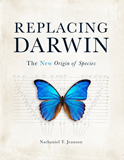
Darwin in the News
Darwin in the News We’re less than two weeks away from Darwin’s birthday, and the news media isn’t forgetting.
A steady uptick in articles on Darwin and evolution heralds the bicentenary of the British naturalist’s birth on February 12. Even though Answers in Genesis already has our Year of Darwin campaign in response (e.g., major conferences in February), we decided to take a peek at four of the more interesting stories.
What Darwin Didn’t Know—A lengthy Smithsonian piece hails On the Origin of Species as “a vibrant and engaging work of literature,” in part because (it alleges) Darwin knew his work was “just the beginning.” In addition to reviewing Darwin’s life and oozing over the centrality of evolution today, the author points out how (curiously) Darwin actually lacked evidence for his hypothesis in such fields as geology and paleontology. (But don’t worry, the author offers piles of more recent “evidence” to prop Darwinism up.)
Hatred of Slavery Drove Darwin Ideas, Book Says—Could it be that Darwin hypothesized evolution for anti-slavery reasons? That’s the wild idea of a new book, Darwin’s Sacred Cause. Reuters reports that authors Adrian Desmond and James Moore argue “a passionate hatred of slavery was fundamental to his theory of evolution, which challenged the assumption held by many at the time that blacks and whites were separate species.” Essentially, they believe (in Moore’s words), “We can’t figure out where else” the idea for evolution came from, other than in an attempt to counter racism. We’d call that specious logic, especially considering the racist implications of Darwin’s idea and Darwin’s own comments about the “savages” of other races. To read more, see Darwin’s Garden.
The Sins of the Fathers, Take 2—Newsweek’s Sharon Begley takes a look at a renewed form of Lamarckism, the old proto-evolutionary idea that the behavior and experience of animals can affect their progeny (such that muscle builders have more muscular children, or giraffes extending their necks to reach distant leaves will yield longer-necked offspring). While Lamarck’s ideas were abandoned long ago, experiments with water fleas and lab mice in the last ten years have shown definite connections between parent experience and offspring behavior. Despite identical genes, water fleas will only grow defensive “helmets” if their mothers encountered predators. While this “new Lamarckism” isn’t on track to replace Darwinism as the standard dogma of naturalistic science, it reminds us that there’s far more to biology than even Darwinists know!
Remote Island Celebrates Pioneer—Remember the famous nineteenth-century biologist who came up with the theory of evolution? Alfred Russel Wallace was his name—does that surprise you? Wallace, a Welsh scientist who devised evolution around the same time as Darwin, rarely receives credit for his contribution—despite the fact that reading Wallace’s writing helped prompt Darwin to publish On the Origin of Species. Residents of the Indonesian island where he once lived aren’t forgetting him, however. (For a fascinating in-depth look on the origin of Origin, see There Is No Darwin Conspiracy.)
Pull the Plug on Atheism—Evangelist and apologist Ray Comfort has launched a new website in the run-up to Darwin’s birthday: one that counters both evolution and atheism. He’s even hoping to find contacts to help him run anti-evolution billboards in time for Darwin’s birthday. If you or anyone you know could help, view his email appeal or pass it to a friend.
For more information:
- Get Answers: Charles Darwin
Remember, if you see a news story that might merit some attention, let us know about it! (Note: if the story originates from the Associated Press, Fox News, MSNBC, the New York Times, or another major national media outlet, we will most likely have already heard about it.) And thanks to all of our readers who have submitted great news tips to us.
(Please note that links will take you directly to the source. Answers in Genesis is not responsible for content on the websites to which we refer. For more information, please see our Privacy Policy.)
Recommended Resources

Answers in Genesis is an apologetics ministry, dedicated to helping Christians defend their faith and proclaim the good news of Jesus Christ.
- Customer Service 800.778.3390
- Available Monday–Friday | 9 AM–5 PM ET
- © 2025 Answers in Genesis





